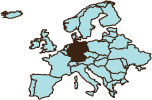German Dining Etiquette
international dining etiquette
Dining etiquette for toasts. The most common toasts are Zum Wohl! (with wine) and Prost! (with beer) - in both cases, generally a wish for good health. Maintain direct eye contact from the moment the glass is raised to the moment it is placed back down on the table. If many people are being toasted, go around the table and make eye contact with each individual as you make the toast. This becomes even more important as you move west to east through Germany.
table manners
Dining etiquette for beginning to eat. Do not begin eating until the host has said, "Guten Appetit"
Dining etiquette for utensils. The knife remains in the right hand, and the fork remains in the left. When the meal is finished, the knife and fork are laid parallel to each other across the right side of the plate, the tips pointing to the ten o'clock position: the knife should be above the fork, with the blade side pointing in toward the plate.
Dining etiquette for the place setting. The fork and spoon above your plate are for dessert. Always start from the outside and work your way in, course by course. There will be separate glasses provided at your setting for water and white and red wine (after-dinner drink glasses come out after dinner).
Dining etiquette for your hands. Your hands should be visible above the table.
Dining etiquette for passing food. Pass all dishes to your left. Salt and pepper shakers or holders should be passed so that the receiving person takes them directly; do not place them on the table first.
Dining etiquette for cutting food. In Germany, knives are used only when absolutely necessary. Therefore, do not cut anything with a knife that can be cut easily with the side of a fork: this means, generally, potatoes, usually served in the sliced or roti (roasted or sautéed) style. Never cut the lettuce in a salad. Fold it with your knife and fork so that it can be picked up with your fork.
Dining etiquette for seating. The most honored position is either at the head of the table or in the center, with the most important guests seated first to the left and then to the right of the head of the table. If there is a hosting couple, one partner will be seated at each end of the table.
Dining etiquette for seconds and refills. If you do not want more food, leave just a bit on your plate. You may always have additional beverages; drink enough to cause your cup or glass to be less than half full, and it will generally be refilled.
Dining etiquette for restaurants. In informal restaurants, you may be required to share a table: if so, do not force conversation; rather, act as if you are seated at a private table. Waitstaff may be summoned by making eye contact; waving or calling their names is very impolite.
Dining etiquette for discussing business. The business lunch or dinner is widespread. Take your cue from your German associates: if they bring up business, then it's okay to discuss it.
Dining etiquette for the home. Meals at a German associate's home can be either relaxed or formal; take your cue from the information your host gives you when you are invited. An informal meal will be referred to as the Abendbrot (evening bread), while the formal meal is usually referred to as the Abendessen (evening meal). It is always best to arrive on time, although here, too, you can get more information at the time of the invitation: if an invitation indicates "c.t." (cum tempore, or "with time"), you have a leeway of about fifteen minutes after the stated arrival time; if the invitation indicates "s.t.' (sine tempore, or "without time"), you are expected to arrive promptly at the hour stated. Once within the home, you will be told where to sit. At the table, look for place cards, or wait until the host indicates your seat.
Dining etiquette for paying the bill. Usually the one who does the inviting pays the bill. Sometimes other circumstances determine the payee (such as rank).
Dining etiquette for tipping. Tipping at restaurants is left up to you. The law requires restaurants to include a gratuity in your bill. This will be about 10 to 15 percent. However, most Germans and visitors leave a bit more if they have received satisfactory service.


-clean.jpg)